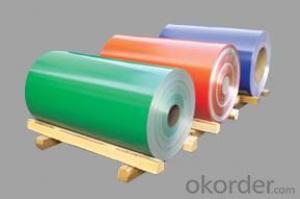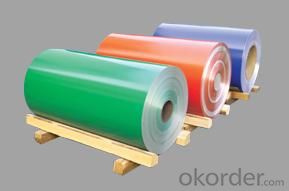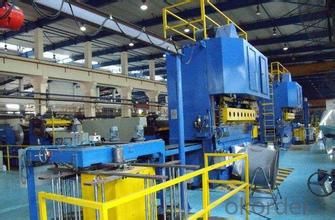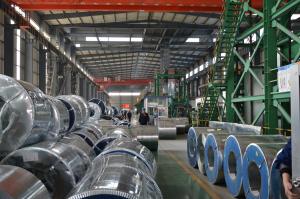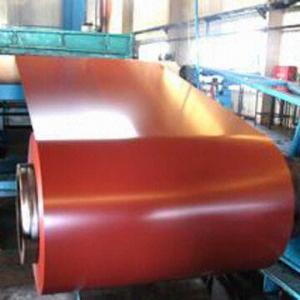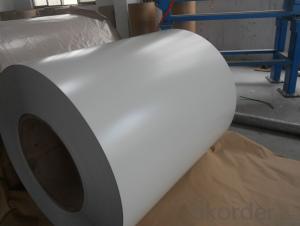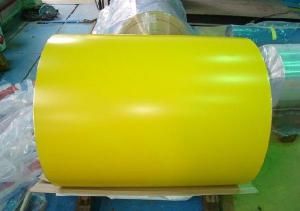Pre-Painted Aluminum Coils Price, Roll
- Loading Port:
- China Main Port
- Payment Terms:
- TT OR LC
- Min Order Qty:
- -
- Supply Capability:
- -
OKorder Service Pledge
OKorder Financial Service
You Might Also Like
Aluminium is a relatively soft,durable, lightweight, ductile and malleablemetalwith appearance ranging from silvery to dull gray, depending on the surfaceroughness. It is nonmagnetic and does not easily ignite. A fresh film ofaluminium serves as a good reflector (approximately 92%) of visible light and an excellent reflector (asmuch as 98%) of medium and far infrared radiation. The yield strengthof pure aluminium is 7–11 MPa, while aluminium alloys have yield strengths ranging from200 MPa to 600 MPa. Aluminium has about one-third the density and stiffness of steel.It is easily machined, cast, drawn and extruded.
Aluminium alloys (or aluminum alloys; see spellingdifferences) are alloysin which aluminium(Al) is the predominant metal. The typical alloying elements are copper, magnesium,manganese,silicon,tin and zinc. There are twoprincipal classifications, namely casting alloys and wrought alloys, both of which are furthersubdivided into the categories heat-treatableand non-heat-treatable. About 85% of aluminium is used for wrought products,for example rolled plate, foils and extrusions.Cast aluminium alloys yield cost-effective products due to the low meltingpoint, although they generally have lower tensile strengthsthan wrought alloys. The most important cast aluminium alloy system is Al–Si,where the high levels of silicon (4.0–13%) contribute to give good castingcharacteristics. Aluminium alloys are widely used in engineering structures andcomponents where light weight or corrosion resistance is required
Features:
1. Excellent quality of products
2. Quick delivery
3. Best service to clients
4. BV,SGS avalible
5. No buckle o waveness
6. Tension leveling
7. Certificate of Origin
8. Form A,E
Packaging Detail: Carton ,Wooden pallet with plastic protection packing,standard seaworthy packing or as your request.
ProductionCapacity:
AnnualProduction capacity of 600,000 tons.
Products areexported to United States, Canada, U.A.E, Brazil, Mexico,Thailand, Vietnam,Nigeria etc, over 100 countries andregions all over the world.
Coveredfactories with full production line
CNBM aluminumproduction base is comprised of 18 aluminumannealers, 10 coil and foilmills, 4 continuous production lines, 2hot rolling production line and 3prepainted lines.
FAQ:
1. What is the form of payment?
Normally 30% TT, L/C
2. Type of quotation?
FOB, CFR, CIF
3. Port of loading?
Shanghai port
4. Delivery time?
30 day after client’s deposit
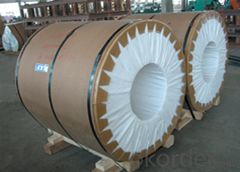
- Q: What is the cost-effectiveness of using aluminum coils in the long run?
- The cost-effectiveness of using aluminum coils in the long run is high. Aluminum coils are durable, corrosion-resistant, and have a long lifespan, reducing maintenance and replacement costs over time. Additionally, aluminum is a lightweight material, resulting in energy savings during transportation and installation. Moreover, aluminum coils offer excellent thermal conductivity, enhancing energy efficiency in heating and cooling systems. Overall, while the initial investment may be higher, the long-term benefits of using aluminum coils outweigh the costs.
- Q: Can aluminum coils be used for signage purposes?
- Signage purposes can indeed utilize aluminum coils. Aluminum, as a lightweight and versatile material, finds common use in the signage industry. It possesses exceptional resistance to corrosion, rendering it suitable for both indoor and outdoor applications. Aluminum coils are easily cut and molded into diverse shapes and sizes, enabling the creation of customized signage designs. Moreover, aluminum exhibits high durability and can endure harsh weather conditions, ensuring longevity for signage. Coils can be painted or coated with various finishes to achieve desired aesthetics, while simultaneously safeguarding against fading and scratching. Ultimately, aluminum coils remain a favored choice for signage due to their versatility, durability, and aesthetic appeal.
- Q: Are aluminum coils suitable for solar panel frames?
- Yes, aluminum coils are suitable for solar panel frames. Aluminum is a lightweight and corrosion-resistant material, making it ideal for use in solar panel frames. It is also highly durable and can withstand various weather conditions, ensuring the longevity of the solar panel structure. Additionally, aluminum is easy to work with and offers excellent heat dissipation properties, which is crucial for solar panels as they generate heat during operation. The use of aluminum coils in solar panel frames helps to enhance the overall efficiency and performance of the solar panel system.
- Q: Can aluminum coils be formed or shaped?
- Certainly, aluminum coils have the capability to undergo formation and shaping. Aluminum, being an extremely pliable metal, can effortlessly be molded or bent into diverse configurations without experiencing any fractures or breaks. Aluminum coils frequently find usage in numerous applications including the production of heat exchangers, condenser coils, evaporator coils, and air conditioning systems. These coils can be transformed into various structures such as flat sheets, tubes, or finned coils, catering to the specific demands of the intended purpose. The adaptability and formability of aluminum coils render them exceptionally versatile and extensively employed across multiple industries.
- Q: What are the different pre-treatment methods for aluminum coils?
- Aluminum coils can undergo various pre-treatment methods to prepare their surface for further processing or coating. These methods serve different purposes and can be chosen based on specific requirements. One pre-treatment method is degreasing, which eliminates oils or greases on the coil surface. Solvents or alkaline cleaners are used for degreasing, depending on the application's needs. Etching is another pre-treatment method that removes surface oxides or contaminants from the aluminum coils. This can be achieved through acidic solutions or mechanical techniques like sandblasting or brushing. Phosphating, a commonly used pre-treatment method, involves applying a phosphate coating to the coil surface. This coating enhances adhesion for subsequent coatings or paints and provides corrosion resistance. Conversion coating is a popular pre-treatment method that forms thin layers of inorganic compounds on the coil surface. These coatings improve adhesion for subsequent coatings or paints and offer corrosion resistance. Common conversion coatings for aluminum include chromate, chromate-free, or anodizing. To summarize, the pre-treatment methods for aluminum coils include degreasing, etching, phosphating, and conversion coating. Each method has a specific purpose in preparing the coil surface for further processing or coating, chosen based on the application's requirements.
- Q: metals an aluminum can is made of, cast aluminum, 6160 aluminum, sheet aluminum
- the aluminum is alloyed with various metals to change the characteristics of the aluminum the link below shows a table showing the various chemical/metals added to aluminum to make different alloys
- Q: Why does it take less energy to get aluminum metal from used cans than to get it directly from the ore?
- in order to extract the raw aluminum, you have to heat everything and melt it first, then remove the stuff that precipitates out as it cools or forms via chemical reaction with catalysts you introduce. With aluminum cans, you don't have to raise the temperature much above the melting point of aluminum, since it's already the substance in the can with the highest melting point. With aluminum ore, there can be anything in the ore with pretty much any melting point. In particular, if the ore contains an alloy of aluminum and a metal with a higher melting point than aluminum, then rest assured, you will have to raise the temperature of the ore above the melting point of aluminum in order to melt that alloy, In any case, because the maximum required temperature of the smelter needed to melt used aluminum cans is necessarily lower than the maximum temperature required to work with the ore, less energy is required to get aluminum from used cans than from ore.
- Q: What are the different protective film options for aluminum coils?
- Aluminum coils have a range of protective film options available, each with its own benefits and suitability for different applications. Some commonly used options include: 1. PVC Film: These films are highly resistant to moisture, chemicals, and abrasion, making them a popular choice for protecting aluminum coils. They offer excellent surface protection and come in various thicknesses and adhesive strengths. 2. PE Film: Another popular choice, PE films provide good resistance to moisture and UV radiation. They are generally more cost-effective than PVC films and are available in different grades, such as LDPE and LLDPE. 3. PP Film: Known for their tear resistance and high tensile strength, PP films are ideal for applications where coils may undergo rough handling or transportation. They offer good protection against mechanical damage. 4. PET Film: PET films offer exceptional clarity and transparency, making them perfect for applications that require visual inspection of the coils. They also provide good resistance to heat, chemicals, and abrasion. 5. Adhesive Coatings: In addition to films, adhesive coatings can be used to protect aluminum coils. These coatings are directly applied to the coil's surface and create a protective layer against moisture, corrosion, and scratching. When choosing a protective film for aluminum coils, it is crucial to consider factors such as the intended application, environmental conditions, handling processes, and desired level of protection. Seeking guidance from a supplier or manufacturer can help determine the most suitable option for specific requirements.
- Q: Are aluminum coils suitable for decorative purposes?
- Yes, aluminum coils are suitable for decorative purposes. They are lightweight, durable, and can be easily shaped and colored to create various decorative elements such as trim, edging, and accents. Additionally, aluminum coils are resistant to corrosion, making them ideal for both indoor and outdoor decorative applications.
- Q: i am thnking of building my own aluminum john boat and using the propulsion from a jetski to power it, i was wondering if anyone had taken on a project like this and had a few pieces of advice to offer while i am still in the planning stages. the biggest concern i have right now involves the tunnel for the intake, should i use the original fiberglass from the jetski or build up a tunnel out of aluminum for it?
- 518 okorder /
Send your message to us
Pre-Painted Aluminum Coils Price, Roll
- Loading Port:
- China Main Port
- Payment Terms:
- TT OR LC
- Min Order Qty:
- -
- Supply Capability:
- -
OKorder Service Pledge
OKorder Financial Service
Similar products
Hot products
Hot Searches
Related keywords
